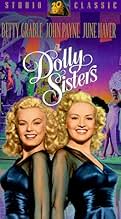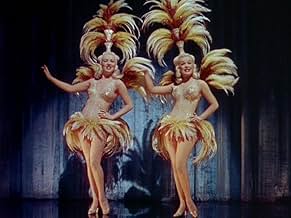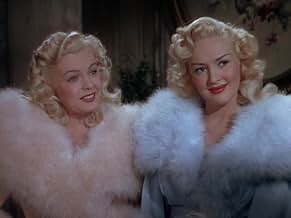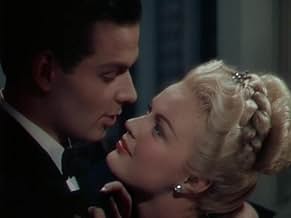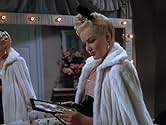VALUTAZIONE IMDb
6,2/10
880
LA TUA VALUTAZIONE
Aggiungi una trama nella tua linguaTwo sisters from Hungary become famous entertainers in the early 1900s. Fictionalized biography with lots of songs.Two sisters from Hungary become famous entertainers in the early 1900s. Fictionalized biography with lots of songs.Two sisters from Hungary become famous entertainers in the early 1900s. Fictionalized biography with lots of songs.
- Regia
- Sceneggiatura
- Star
- Candidato a 1 Oscar
- 1 candidatura in totale
Fred Aldrich
- Soldier
- (non citato nei titoli originali)
Lester Allen
- Morrie Keno
- (non citato nei titoli originali)
Herbert Ashley
- Fields
- (non citato nei titoli originali)
Nino Bellini
- French Actor
- (non citato nei titoli originali)
Brooks Benedict
- Party Guest
- (non citato nei titoli originali)
Trude Berliner
- German Actress
- (non citato nei titoli originali)
Edward Biby
- Party Guest
- (non citato nei titoli originali)
Lulu Mae Bohrman
- Party Guest
- (non citato nei titoli originali)
Eddie Borden
- Man on Bus
- (non citato nei titoli originali)
Recensioni in evidenza
"The Dolly Sisters" is Betty Grable and June Haver's most joyously tuneful musical, a gaudy, loud, exquisitely Technicolored extravaganza of songs, dancing, and romance, the kind of vacuous yet tasteful fluff 20th Century Fox did well with great success. The studio head, Darryl Zanuck intended as a vehicle for Alice Faye & Betty Grable, but he couldn't convince Faye to get out of retirement, so producer George Jessel casted June Haver, and the movie become one of the top grossing pictures of the 1940s.
Grable and Haver (fantastic throughout) are the Hungarian born blonde sisters, Jenny & Rosie that took Broadway by storm. Their story begins with their arrival in New York in 1904, their subsequent rise from vaudeville acts to Broadway & Folies Bergere of Paris. They meet an aspiring composer Harry (John Payne) who arranges a meeting with Oscar Hammerstein to appear his Music Hall. Betty falls in love with Harry while June settles for a far less troubled romance with Frank Latimore. Betty is particularly very revealing, especially when she gets the nervous breakdown. Good performances also by S.Z. Sakall and Reginald Gardiner.
Lots of rollicking, uproarious songs/numbers, including the Oscar-winning "I Can't Begin to Tell You", the haunting "I'm Always Chasing Rainbows", plus some kitschy stuff like "Powder, Lipstick and Rouge", "Give Me The Moonlight, Give Me The Girl".
"Dolly Sisters" can be best appreciated if you see it back to back with June Haver's 1946's musical, "Three Little Girls in Blue", a joyous merriment in need of resurrection.
Grable and Haver (fantastic throughout) are the Hungarian born blonde sisters, Jenny & Rosie that took Broadway by storm. Their story begins with their arrival in New York in 1904, their subsequent rise from vaudeville acts to Broadway & Folies Bergere of Paris. They meet an aspiring composer Harry (John Payne) who arranges a meeting with Oscar Hammerstein to appear his Music Hall. Betty falls in love with Harry while June settles for a far less troubled romance with Frank Latimore. Betty is particularly very revealing, especially when she gets the nervous breakdown. Good performances also by S.Z. Sakall and Reginald Gardiner.
Lots of rollicking, uproarious songs/numbers, including the Oscar-winning "I Can't Begin to Tell You", the haunting "I'm Always Chasing Rainbows", plus some kitschy stuff like "Powder, Lipstick and Rouge", "Give Me The Moonlight, Give Me The Girl".
"Dolly Sisters" can be best appreciated if you see it back to back with June Haver's 1946's musical, "Three Little Girls in Blue", a joyous merriment in need of resurrection.
The real-life Dolly sisters were brunettes but that didn't stop Fox from pairing Bette Grable and June Haver as the famous duo, in addition to fictionalizing their rise to fame in vaudeville and the legit circuit. Nevertheless, this is a typical 1940s charmer of a musical, with the talented John Payne for added appeal and good performances by S. Z. Sakall and Reginald Gardiner. Grable and Haver are seen in a good number of singing and dancing routines and there is even one new song ("I Can't Begin To Tell You") supposedly penned by John Payne. It's all very likeable technicolored entertainment in lavish style. Betty's role is a little more dramatic than usual and she does a good piece of emoting in the final scenes. If you're a Grable fan, you can't afford to miss this one! And she was never better than when she was teamed opposite John Payne--good chemistry and believable sparks.
This colorful musical directed with great style by Irving Cummings is a delightful way to spend some happy moments. This 1945 Fox film presents the life of two sisters that became a sensation in America at the beginning of the last century. The music is the best excuse to watch this happy movie.
We first meet the young Dolly Sisters, Jenny and Rose, as they arrive in America from their native Hungary. The girls are talented and soon, they are delighting the vaudeville circuit with their charm and talent. Their career soared after Harry Fox, who later became Jenny's husband, introduces them to the great Oscar Hammerstein, who sees in the women, an amazing capacity to entertain the public of the era.
As played by Betty Grable and June Haver, the Dolly Sisters are irresistible! The real sisters were not blond, but who could fault the stars with the disarming way they act in the musical? Ms. Grable and Ms. Haver are a sight for sore eyes!
As the man in Jennie's life, John Payne plays Harry Fox convincingly. Mr. Payne projects a virile figure and he is perfect opposite the gorgeous Betty Grable. His composition in the movie, "I'm Always Chasing Rainbow" was written by Harry Carroll and Joseph McCarthy whose inspiration is the Chopin's Fantasy and Impromptu in C Minor and it blends perfectly in the composition and in the subtext of the film. There are also appearances by that charming character actor, S. Z. Sakall, who plays the girl's uncle. Also Reginald Gardiner does good work as the Duke of Breck.
This is a fine musical that will delight fans of the genre.
We first meet the young Dolly Sisters, Jenny and Rose, as they arrive in America from their native Hungary. The girls are talented and soon, they are delighting the vaudeville circuit with their charm and talent. Their career soared after Harry Fox, who later became Jenny's husband, introduces them to the great Oscar Hammerstein, who sees in the women, an amazing capacity to entertain the public of the era.
As played by Betty Grable and June Haver, the Dolly Sisters are irresistible! The real sisters were not blond, but who could fault the stars with the disarming way they act in the musical? Ms. Grable and Ms. Haver are a sight for sore eyes!
As the man in Jennie's life, John Payne plays Harry Fox convincingly. Mr. Payne projects a virile figure and he is perfect opposite the gorgeous Betty Grable. His composition in the movie, "I'm Always Chasing Rainbow" was written by Harry Carroll and Joseph McCarthy whose inspiration is the Chopin's Fantasy and Impromptu in C Minor and it blends perfectly in the composition and in the subtext of the film. There are also appearances by that charming character actor, S. Z. Sakall, who plays the girl's uncle. Also Reginald Gardiner does good work as the Duke of Breck.
This is a fine musical that will delight fans of the genre.
Betty Grable and June Haver are "The Dolly Sisters" in this 1945 film also starring John Payne, S.Z. Sakall and Reginald Gardner. Grable enjoyed an unparalleled run - 10 years in a row - in the Hollywood top ten box office, from 1941 to 1951, yet when Turner Classic Movies published their Unforgettable Leading Ladies of the Studio Era book, Grable was left out. For anyone who believes - erroneously - that Turner Classic Movies has any interest in film history, she was left out - just as Tyrone Power was left out of the leading men book - because TCM doesn't own their films.
Not realizing that for a huge audience later on, it wouldn't exist, 20th Century Fox spared no expense for this lavish color musical about two real-life Hungarian sisters (actually brunettes) who were big entertainers in the beginning of the century. The story focuses on Jenny Dolly (Grable) primarily and her romance and marriage to Ziegfeld performer Harry Fox (inventor of the "fox trot"), played by John Payne, and how World War I and career separations destroyed their marriage.
Grable and Haver look just like sisters and are marvelous together, wearing gorgeous costumes and looking fabulous and radiant throughout. Both bring a lot of energy to their roles. Payne does a good job as Harry, singing and acting well. A versatile actor, he could not only appear in musicals where he did his own singing, but he did plenty of drama and was also a hunk. He was invaluable to Fox during the war years.
This is a very entertaining film, but it's a shame that a film on the true story of the Dolly Sisters has never been made. Jenny and Fox were divorced in 1921. She was indeed involved in a car accident with an ex-boyfriend in 1933 and had to sell her jewels to pay for many surgeries, but unlike the film, she never really recovered. She never reconciled with Fox and in 1941, she hung herself. Rosie did marry a Chicago businessman; she attempted suicide in 1962, though it failed, and she died in 1970. The two women were huge gamblers, only hinted at in the film, and made a fortune: They won $850,000 in one season at Deauville and one evening in Cannes, Jenny won 4 million francs, which she converted to a collection of jewelry, and then went on to win another 11 million more francs.
I suppose during World War II, no one would have been interested in such a downer, so it's just as well that we have this film, which gives us vibrant entertainment in the best 20th Century Fox tradition.
Not realizing that for a huge audience later on, it wouldn't exist, 20th Century Fox spared no expense for this lavish color musical about two real-life Hungarian sisters (actually brunettes) who were big entertainers in the beginning of the century. The story focuses on Jenny Dolly (Grable) primarily and her romance and marriage to Ziegfeld performer Harry Fox (inventor of the "fox trot"), played by John Payne, and how World War I and career separations destroyed their marriage.
Grable and Haver look just like sisters and are marvelous together, wearing gorgeous costumes and looking fabulous and radiant throughout. Both bring a lot of energy to their roles. Payne does a good job as Harry, singing and acting well. A versatile actor, he could not only appear in musicals where he did his own singing, but he did plenty of drama and was also a hunk. He was invaluable to Fox during the war years.
This is a very entertaining film, but it's a shame that a film on the true story of the Dolly Sisters has never been made. Jenny and Fox were divorced in 1921. She was indeed involved in a car accident with an ex-boyfriend in 1933 and had to sell her jewels to pay for many surgeries, but unlike the film, she never really recovered. She never reconciled with Fox and in 1941, she hung herself. Rosie did marry a Chicago businessman; she attempted suicide in 1962, though it failed, and she died in 1970. The two women were huge gamblers, only hinted at in the film, and made a fortune: They won $850,000 in one season at Deauville and one evening in Cannes, Jenny won 4 million francs, which she converted to a collection of jewelry, and then went on to win another 11 million more francs.
I suppose during World War II, no one would have been interested in such a downer, so it's just as well that we have this film, which gives us vibrant entertainment in the best 20th Century Fox tradition.
I was 8 years old when I first saw this movie in 1945. I was so impressed with the blond beauty of both girls and to know that the Dolly Sisters were real people. June Haver and Betty Grable really looked alike. In my childs mind I thought they were my private dancers and I wanted to be just like them. I actually thought I was the only one who knew about them and they were my secret......What a kid! Thanks for listening. Florence Forrester-Stockton
Lo sapevi?
- ConnessioniFeatured in Gotta Dance, Gotta Sing (1982)
I più visti
Accedi per valutare e creare un elenco di titoli salvati per ottenere consigli personalizzati
- How long is The Dolly Sisters?Powered by Alexa
Dettagli
- Data di uscita
- Paese di origine
- Lingua
- Celebre anche come
- The Dolly Sisters
- Luoghi delle riprese
- Azienda produttrice
- Vedi altri crediti dell’azienda su IMDbPro
Botteghino
- Budget
- 2.510.000 USD (previsto)
- Tempo di esecuzione1 ora 54 minuti
- Proporzioni
- 1.37 : 1
Contribuisci a questa pagina
Suggerisci una modifica o aggiungi i contenuti mancanti

Divario superiore
By what name was Donne e diamanti (1945) officially released in Canada in English?
Rispondi

